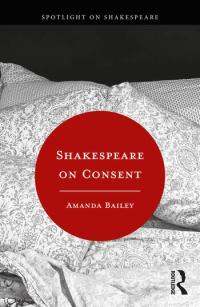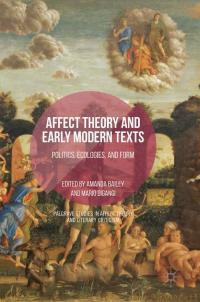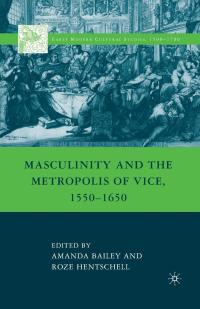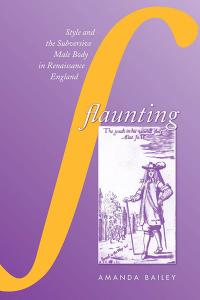Amanda Bailey

ADVANCE Professor, English
Department Chair, English
abailey7@umd.edu
2119 Tawes Hall
Get Directions
Research Expertise
Early Modern Studies
Amanda Bailey (she/her) is ARHU ADVANCE Professor and Chair of the Department of English at the University of Maryland. She also serves on the Folger Institute's Executive Committee. She earned a Ph.D. in English Literature and Graduate Certificate in Women’s/Gender Studies from the University of Michigan and B.A. in English and Creative Writing from Oberlin College. A scholar of early modern literature and culture, her teaching and research focus on the histories of marginalized peoples and systems of oppression, political and legal thought, and current state of higher education. In addition to numerous essays, journal articles, and edited volumes, she has published monographs on queer subcultures in early modern London (Flaunting: Style and the Subversive Male Body in Renaissance England [University of Toronto Press, 2007; reissued in paperback 2019]); debt culture and the Anglo-American slave trade (Of Bondage: Debt, Property, and Personhood in Early Modern England [University of Pennsylvania Press, 2013]; and, most recently, a book on campus consent culture and teaching and learning in the contexts of #Metoo and Title IX (Shakespeare on Consent [Routledge, 2023]). She has also published in Inside Higher Ed and been featured in The Washington Post. She is a recipient of a University of Maryland, College of Arts and Humanities Faculty Award for service to the College, as well as fellowships from the Mellon Foundation and the Newberry Library.
Publications
Shakespeare on Consent
"Shakespeare on Consent" explores how early modern drama sheds light on contemporary debates about consent amid the global #MeToo movement.
Author/Lead: Amanda Bailey
Choice is the defining issue of the twenty-first century. As the #MeToo movement extends its legal, social, and political reach around the world, the topic of consent has come under particular scrutiny. Shakespeare on Consent examines crises of consent on the early modern stage and argues that these dramatizations provide a framework for understanding the intersections of coercion, complicity, resistance, and agency.
Beginning with the premise that consent serves as a lever of entitlement, Amanda Bailey introduces a Shakespeare well aware that liberal selfhood has never been universally available. Bailey brings Shakespeare’s work into conversation with the Penn State Sandusky scandal, the Bill Clinton–Monica Lewinsky affair, the rise of "somnophilia," Jordan Peele’s documentary on Lorena Bobbitt, Larry David’s Curb Your Enthusiasm, and Harvey Weinstein’s Shakespeare in Love, amongst others. Bailey considers who is denied access to the apparatus of consent, under what circumstances, and how consent is vitiated by race, class, ethnicity, sexuality, disability, and gender.
Shakespeare on Consent is a wake-up call for all implicated in the injurious outcomes of consent and will inspire those wanting to mobilize choice in the service of social and political transformation.
Shakespeare on Consent
Shakespeare on Consent examines crises of consent on the early modern stage and argues that these dramatizations provide a framework for understanding the intersections of coercion, complicity, resistance, and agency.
Author/Lead: Amanda Bailey
Beginning with the premise that consent serves as a lever of entitlement, Amanda Bailey introduces a Shakespeare well aware that liberal selfhood has never been universally available. Bailey brings Shakespeare’s work into conversation with the Penn State Sandusky scandal, the Bill Clinton–Monica Lewinsky affair, the rise of "somnophilia," Jordan Peele’s documentary on Lorena Bobbitt, Larry David’s Curb Your Enthusiasm, and Harvey Weinstein’s Shakespeare in Love, amongst others. Bailey considers who is denied access to the apparatus of consent, under what circumstances, and how consent is vitiated by race, class, ethnicity, sexuality, disability, and gender. Shakespeare on Consent is a wake-up call for all implicated in the injurious outcomes of consent and will inspire those wanting to mobilize choice in the service of social and political transformation.
City of Incurable Women
In "City of Incurable Women," Maud Casey reimagines the lives of 19th-century female psychiatric patients confined in Paris’s Salpêtrière hospital, transforming them from study specimens into fully realized people with rich inner lives.
Author/Lead: Amanda Bailey
“Where are the hysterics, those magnificent women of former times?” wrote Jacques Lacan. Long history’s ghosts, marginalized and dispossessed due to their gender and class, they are reimagined by Maud Casey as complex, flesh-and-blood people with stories to tell. These linked, evocative prose portraits, accompanied by period photographs and medical documents both authentic and invented, poignantly restore the humanity to the nineteenth-century female psychiatric patients confined in Paris’s Salpêtrière hospital and reduced to specimens for study by the celebrated neurologist Jean-Martin Charcot and his male colleagues.
Affect Theory and Early Modern Texts: Politics, Ecologies, and Form
This volume demonstrates how questions of affect illuminate issues of cognition, political agency, historiography, and scientific thought in early modern literature and culture.
Author/Lead: Amanda Bailey
From the publisher:
The first book to put contemporary affect theory into conversation with early modern studies,this volume demonstrates how questions of affect illuminate issues of cognition, political agency, historiography, and scientific thought in early modern literature and culture. Engaging various historical and theoretical perspectives, the essays in this volume bring affect to bear on early modern representations of bodies, passions, and social relations by exploring: the role of embodiment in political subjectivity and action; the interactions of human and non-human bodies within ecological systems; and the social and physiological dynamics of theatrical experience. Examining the complexly embodied experiences of leisure, sympathy, staged violence, courtiership, envy, suicide, and many other topics, the contributors open up new ways of understanding how Renaissance writers thought about the capacities, pleasures, and vulnerabilities of the human body.
“Comedies’ Sympathetic Economies"
Far from being a well-regulated, predictable totality, the early modern English economy defied reliable oversight.
Author/Lead: Amanda Bailey“Speak What We Feel: Sympathy and Statecraft"
This chapter demonstrates the ways the early modern belief in dispersed sympathetic forces informs the representation of political obedience in King Lear.
Author/Lead: Amanda BaileyRead More about “Speak What We Feel: Sympathy and Statecraft"
“Writings and the Problem of Satisfaction in Michaelmas Term”
Amanda Bailey argues that the city comedy genre, with its investigation of homoerotic networks of financial and social obligation, is both structurally and thematically indebted to changing practices surrounding the debt bond.
Author/Lead: Amanda BaileyHer essay traces how the landmark legal decision of Slade’s Case is processed through Thomas Middleton’s use of the debt bond in Michaelmas Term—a play that dramatises for the benefit of its Inns of Court audience ‘the court’s intensified interest in the intentionality of the debtor.’
Read More about “Writings and the Problem of Satisfaction in Michaelmas Term”
Of Bondage: Debt, Property, and Personhood in Early Modern England
Focusing on this historical juncture at which debt litigation was not merely an aspect of society but seemed to engulf it completely, Of Bondage examines a culture that understood money and the body of the borrower as comparable forms of property that imp
Author/Lead: Amanda Bailey
Amanda Bailey shows that the early modern theater, itself dependent on debt bonds, was well positioned to stage the complex ethical issues raised by a system of forfeiture that registered as a bodily event. While plays about debt like The Merchant of Venice and The Custom of the Country did not use the language of political philosophy, they were artistically and financially invested in exploring freedom as a function of possession. By revealing dramatic literature's heretofore unacknowledged contribution to the developing narrative of possessed persons, Amanda Bailey not only deepens our understanding of creditor-debtor relations in the period but also sheds new light on the conceptual conditions for the institutions of indentured servitude and African slavery. Of Bondage is vital not only for students and scholars of English literature but also for those interested in British and colonial legal history, the history of human rights, and the sociology of economics.
Read More about Of Bondage: Debt, Property, and Personhood in Early Modern England
Of Bondage: Debt, Property, and Personhood in Early Modern England
Focusing on a historical juncture at which debt litigation engulfed society, Of Bondage examines a culture that understood money and the body of the borrower as comparable forms of property that impinged on one another at the moment of default.
Author/Lead: Amanda BaileyThe late sixteenth-century penal debt bond, which allowed an unsatisfied creditor to seize the body of his debtor, set in motion a series of precedents that would haunt the legal, philosophical, and moral problem of property-in-person in England and America for centuries. Focusing on a historical juncture at which debt litigation was not merely an aspect of society but seemed to engulf it completely, Of Bondage examines a culture that understood money and the body of the borrower as comparable forms of property that impinged on one another at the moment of default.
Masculinity and the Metropolis of Vice, 1550-1650
Leading authors in the field of early modern studies explore a range of bad behaviours.
Author/Lead: Amanda Bailey
Leading authors in the field of early modern studies explore a range of bad behaviours - like binge drinking, dicing, and procuring prostitutes at barbershops - in order to challenge the notion that early modern London was a corrupt city that ruined innocent young men.
Read More about Masculinity and the Metropolis of Vice, 1550-1650
Flaunting: Style and the Subversive Male Body in Renaissance England
In the early modern period, the theatrical stage offered one of the most popular forms of entertainment and aesthetic pleasure.
Author/Lead: Amanda Bailey
In the early modern period, the theatrical stage offered one of the most popular forms of entertainment and aesthetic pleasure. It also fulfilled an important cultural function by displaying modes of behaviour and dramatizing social interaction within a community. Flaunting argues that the theatre in late sixteenth-century England created the conditions for a subculture of style whose members came to distinguish themselves by their sartorial extravagance and social impudence.
Drawing on evidence from legal documents, economic treatises, domestic manuals, accounts of playhouse practices, and stage plays, Amanda Bailey critiques standard accounts maintaining that those who flaunted their apparel were simply aspirants, or gaudy versions of the superiors they sought to emulate. Instead, she suggests that what mattered most was not what these young men wore but how they wore their clothes. These young men shared a distinctive sartorial sensibility and used that sensibility to undermine authority at all levels of society. Flaunting therefore, examines male style as a visual form of subversion against the norms of Renaissance England with the stage as the primary source of inspiration for collective identification.
Read More about Flaunting: Style and the Subversive Male Body in Renaissance England



